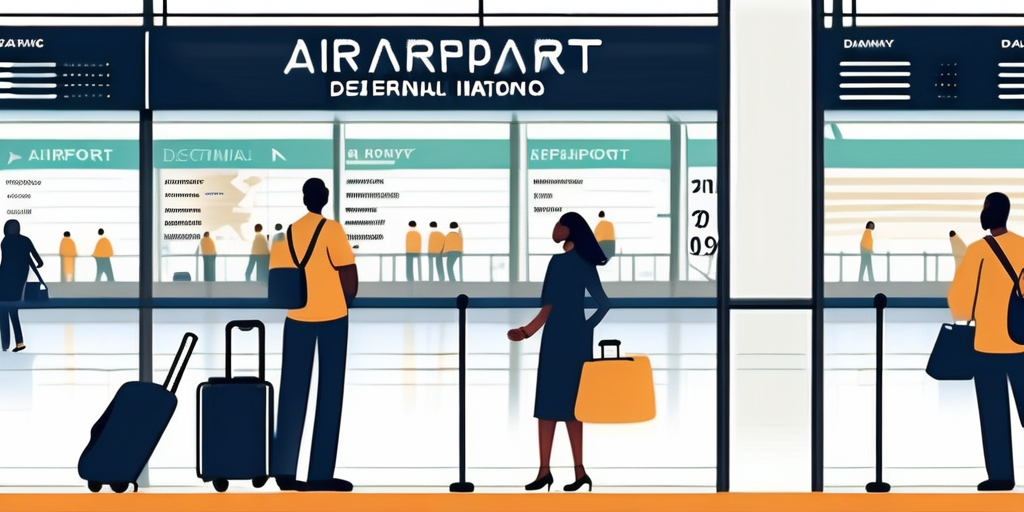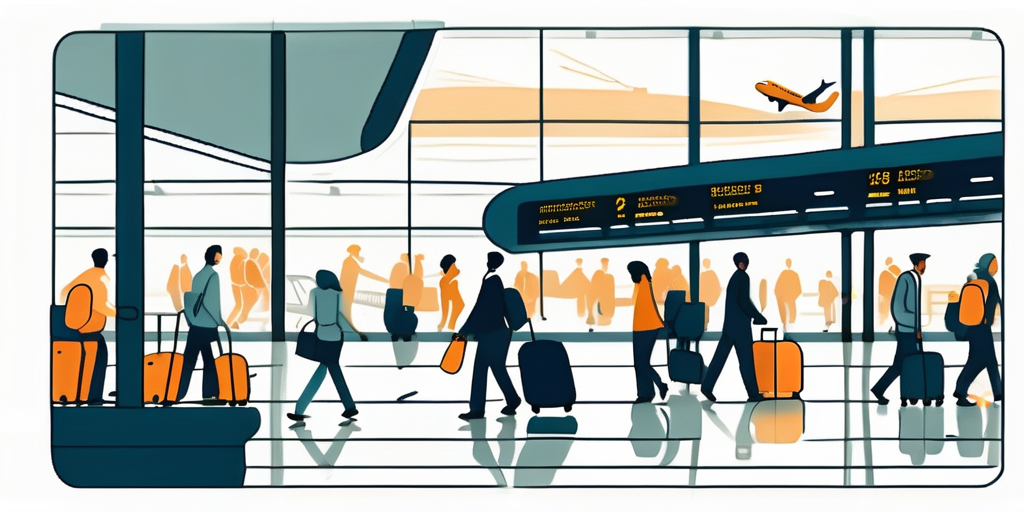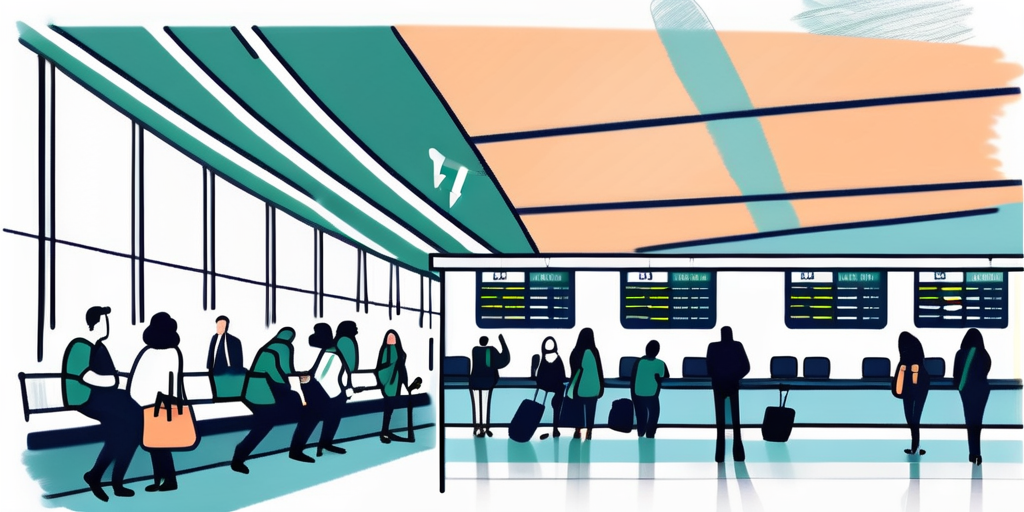Will a Connecting Flight Wait for You?
Curious about connecting flight wait times? Find out what to expect and how to navigate tight connections for smoother travels.
In the fast-paced world of air travel, making a connection can sometimes feel like a race against time. With hundreds of flights taking off and landing every day, it's natural to wonder, "Will a connecting flight wait for me?" Understanding airline policies on connecting flights is crucial for navigating the often stressful world of air travel and ensuring a smooth journey from start to finish.
Understanding Airline Policies on Connecting Flights
When it comes to connecting flights, each airline has its own policies and procedures in place. These policies dictate how airlines handle passengers who are making a connection, as well as the factors that influence their decisions.
It's important to note that airline policies on connecting flights can vary widely from carrier to carrier. Some airlines may have more lenient policies that prioritize passenger convenience, while others may have stricter guidelines focused on operational efficiency.
The Role of Airline Policies
Airline policies on connecting flights are designed to ensure efficient operations and minimize disruptions to flight schedules. While customer satisfaction is important, the primary focus is on maintaining the integrity of the airline's overall flight network.
These policies are carefully crafted to strike a balance between meeting passenger needs and safeguarding the airline's operational interests. By establishing clear guidelines, airlines aim to streamline the connection process and provide a seamless travel experience for passengers.
Factors Influencing Airline Decisions
Several factors can influence an airline's decision on whether or not to wait for passengers making a connection. These factors include the airline's policy on minimum connection times, the availability of alternate flights, and the impact of delaying an entire aircraft.
In addition to these factors, airlines also take into account the number of passengers affected by a potential delay, the time of day, and the overall impact on their flight network. Balancing these considerations is crucial for airlines to make informed decisions that benefit both passengers and the airline's operational efficiency.
The Impact of Flight Delays on Connections
Flight delays are an unfortunate reality of air travel. Understanding how these delays can affect your connection is essential for managing your travel plans effectively.
 Furthermore, the ripple effect of flight delays can extend beyond just missing a connecting flight. It can lead to additional stress, financial implications, and inconvenience for travelers. For instance, missed connections may result in having to rebook flights, potentially incurring extra costs or being stranded at an airport until the next available flight.
Furthermore, the ripple effect of flight delays can extend beyond just missing a connecting flight. It can lead to additional stress, financial implications, and inconvenience for travelers. For instance, missed connections may result in having to rebook flights, potentially incurring extra costs or being stranded at an airport until the next available flight.
Common Causes of Flight Delays
Flight delays can occur for various reasons, including severe weather conditions, mechanical issues, air traffic congestion, and crew availability. While airlines strive to minimize delays, these factors are sometimes beyond their control.
Moreover, unexpected events such as airport closures, security incidents, or medical emergencies can also contribute to flight delays. These unforeseen circumstances can disrupt flight schedules and lead to domino effects across multiple flights and airports.
How Delays Affect Your Connection
When a delay occurs, the time available to make a connection becomes shorter. If the delay is significant, you may miss your connecting flight altogether. Understanding the potential impact of a delay can help you make informed decisions during your journey.
It's important to note that airlines have different policies regarding missed connections due to delays. Some may automatically rebook you on the next available flight, while others may require you to make alternative arrangements. Being aware of your rights as a passenger can empower you to navigate unexpected delays more effectively.
Strategies to Minimize Risk of Missing a Connection
While delays are sometimes unavoidable, there are strategies you can employ to minimize the risk of missing a connection and ensure a smoother travel experience.
 One additional strategy to consider is researching the airports you will be connecting through. Understanding the layout of the airport, the distance between gates, and the average time it takes to move between terminals can help you plan your connection more effectively. Some airports even offer services like shuttle buses or trains to help passengers quickly navigate the airport.
One additional strategy to consider is researching the airports you will be connecting through. Understanding the layout of the airport, the distance between gates, and the average time it takes to move between terminals can help you plan your connection more effectively. Some airports even offer services like shuttle buses or trains to help passengers quickly navigate the airport.
Choosing Longer Layovers
When booking your flights, consider opting for longer layovers. While this may increase your total travel time, it allows for a buffer in case of unexpected delays.
Moreover, longer layovers can provide an opportunity to explore the connecting city. You can use this time to relax, grab a meal, or even take a quick tour of the city if the layover is extended. This can turn a stressful connection into a mini adventure.
Booking Early Flights
Booking early morning flights can also help minimize the risk of missing a connection. These flights tend to have fewer delays, as they are less affected by the buildup of delays throughout the day.
In addition, early morning flights often have shorter security lines and less crowded airports, making the check-in and boarding process smoother and quicker. This can give you a head start on your journey and reduce the chances of missing your connecting flight.
Rights and Compensation for Missed Connecting Flights
If despite your best efforts, you do miss a connecting flight, it's essential to understand your rights and the available options for compensation.
 Missing a connecting flight can be a stressful experience, but knowing your rights can help alleviate some of the frustration. In addition to rebooking on the next available flight, passengers may also be entitled to meals, accommodations, or transportation vouchers depending on the circumstances of the delay.
Missing a connecting flight can be a stressful experience, but knowing your rights can help alleviate some of the frustration. In addition to rebooking on the next available flight, passengers may also be entitled to meals, accommodations, or transportation vouchers depending on the circumstances of the delay.
Understanding Passenger Rights
Passengers have certain rights when it comes to missed connections. These rights can vary depending on the airline, but generally include rebooking on the next available flight and, in some cases, compensation for inconveniences caused.
It's important to note that passenger rights can also be influenced by the governing aviation regulations in the country where the missed connection occurred. Familiarizing yourself with these regulations can provide additional leverage when seeking compensation for a missed connection.
Seeking Compensation for Missed Connections
If you believe that the airline's actions or negligence led to your missed connection, you may be entitled to compensation. Familiarize yourself with the airline's compensation policies and procedures to ensure you receive what you're entitled to.
When seeking compensation for a missed connection, it's helpful to document the circumstances surrounding the delay, including any communication with airline staff, boarding passes, and receipts for any additional expenses incurred. This documentation can strengthen your case when presenting it to the airline for compensation.
Tips for Dealing with Missed Connecting Flights
When faced with a missed connection, it's crucial to take immediate steps to minimize any further disruptions to your travel plans.
Missing a connecting flight can be a traveler's worst nightmare, but knowing how to handle the situation can make all the difference. From navigating airport terminals to dealing with airline customer service, there are several steps you can take to mitigate the impact of a missed connection.
Immediate Steps to Take
As soon as you realize you've missed your connection, locate the airline's customer service desk and inform them of your situation. They will guide you through the rebooking process and provide assistance.
It's important to remain calm and polite when speaking to airline representatives, as they have the power to help you secure a new flight and potentially arrange accommodations if needed. Remember, they deal with frustrated passengers every day, so a little kindness can go a long way in ensuring a smoother rebooking process.
How to Handle Rebooking and Accommodation
When rebooking your flights, be prepared for the possibility of delays and limited availability. If necessary, inquire about accommodation options provided by the airline and explore alternative travel arrangements.
Depending on the reason for missing your connection, such as a delayed incoming flight or long security lines, the airline may offer assistance with overnight stays, meal vouchers, or transportation to a nearby hotel. Understanding your rights as a passenger can also help you advocate for fair treatment and compensation in case of significant delays or cancellations.
While connecting flights can be stressful, understanding airline policies and taking proactive measures can greatly reduce the risk of missing a connection. By being prepared and knowing your rights, you can navigate the world of air travel with confidence and peace of mind.
Secure Your Compensation with ClaimCompass
Missed your connecting flight and faced with unexpected delays? Don't let the stress of disrupted travel plans weigh you down. ClaimCompass is here to assist you in claiming up to 600€ in compensation for flight delays, cancellations, and overbookings. Our expertise in EU Regulation 261/2004 and our commitment to air passenger rights means we handle everything for you—from submitting your claim to taking the airline to court if necessary. Use our free compensation calculator to check your eligibility and let us take care of the rest. Remember, there's no fee unless we secure your compensation. Submit a claim today and let ClaimCompass navigate the complexities of air travel compensation on your behalf.
